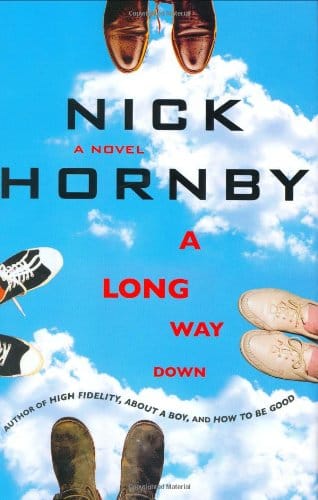Exploring ‘A Long Way Down’: Themes, Characters, and Cultural Impact

Introduction to Nick Hornby’s Darkly Comic Masterpiece
Published in 2005, Nick Hornby’s novel A Long Way Down quickly cemented its place among contemporary British fiction. Blending biting humor with poignant insights into depression and suicide, the book follows four strangers who meet on a London rooftop on New Year’s Eve, each intending to end their life. Instead of jumping, they form an unlikely pact to survive—at least until Valentine’s Day—sparking a journey that is as hilarious as it is heartbreaking.
Plot Summary: Four Voices on One Roof
The narrative unfolds through alternating first-person chapters, giving readers intimate access to the thoughts of Martin, Maureen, Jess, and JJ. Martin, a disgraced TV presenter, has lost his career and family after a scandal. Maureen, a lonely single mother, feels trapped by the unending care her disabled son requires. Jess, a volatile teenager, reels from romantic rejection and the disappearance of her older sister. JJ, an American musician, masks deep despair over the collapse of his band and relationship. Their rooftop encounter leads to an awkward coffee shop deal: stay alive for six weeks and reevaluate.
The Road Trip That Changes Everything
The group’s temporary truce sends them on misadventures across London and even to the sun-soaked beaches of Tenerife as they try to escape relentless paparazzi and public scrutiny. Along the way, Hornby skillfully juxtaposes laugh-out-loud moments—such as a disastrous daytime TV appearance—with raw confessions about living with mental illness. The plot’s episodic structure mirrors the unpredictable rhythm of recovery, underscoring the novel’s central idea that progress rarely moves in a straight line.
Major Themes: Life, Death, and the Spaces In-Between
Mental Health and Stigma
A Long Way Down tackles depression head-on, exposing the societal taboos that still surround it. Hornby refuses to cast his characters as tragic clichés; instead, their suicidal ideation is portrayed as messy, complicated, and painfully ordinary. By letting readers inhabit each character’s mind, the novel chips away at the stigma, revealing that despair can touch anyone—celebrities, caregivers, teenagers, or artists.
Connection Versus Isolation
Another core theme is the transformative power of human connection. Martin, Maureen, Jess, and JJ start as strangers bound only by a shared death wish. Through reluctant camaraderie, they learn that vulnerability can be a lifeline. Hornby suggests that while connection cannot “fix” mental illness, honest relationships provide crucial scaffolding for recovery.
The Search for Meaning
The novel also interrogates what makes life worth living. Whether it is JJ rediscovering music, Maureen realizing her son’s smile is enough reason to stay, or Jess seeking closure about her sister, each character must redefine purpose. The message is subtle yet profound: meaning is found in small, personal victories rather than grand, cinematic epiphanies.
Character Analysis: Flawed Yet Unforgettable
Martin Sharp
Martin is perhaps the most controversial figure—privileged, arrogant, and self-destructive. His sarcasm shields deep shame, illustrating how public downfall can warp identity. Despite his flaws, Martin’s gradual acceptance of accountability makes him a linchpin in the group.
Maureen Thompson
Maureen’s chapters are the emotional heart of the story. Her quiet desperation contrasts sharply with Jess’s explosive grief. Hornby uses Maureen to spotlight unpaid caregivers, a demographic often overlooked in mental-health discussions. Her journey toward self-compassion is arguably the novel’s most uplifting arc.
Jess Crichton
Chaotic and foul-mouthed, Jess provides much of the book’s comic relief, yet her pain is profound. Her impulsivity masks fear of abandonment, and her storyline underscores the importance of acknowledging unresolved trauma.
JJ Maguire
JJ personifies the existential dread facing many creatives. By claiming he has a terminal illness (which he does not), JJ exposes the lengths people go to justify feelings they themselves deem “unacceptable.” His eventual honesty paves the way for authentic healing.
From Page to Screen: The 2014 Film Adaptation
Directed by Pascal Chaumeil and starring Pierce Brosnan, Toni Collette, Imogen Poots, and Aaron Paul, the 2014 adaptation brought the novel’s blend of humor and melancholy to a wider audience. While the film condenses subplots to fit a 96-minute runtime, it captures the story’s central conceit: that life’s messiness can foster unexpected solidarity. For readers seeking a faithful yet visually engaging retelling, the film offers an accessible entry point—though the book’s nuanced internal monologues remain unparalleled.
Critical Reception and Cultural Impact
Upon release, A Long Way Down garnered praise for treating suicide with both seriousness and irreverence—a delicate balancing act few authors attempt. Critics hailed Hornby’s signature wit and his ability to write complex, authentic dialogue. Mental-health advocates have since cited the novel as a valuable tool for sparking conversations about suicide prevention. Book clubs, classroom syllabi, and online forums continue to dissect its layered themes, proving the story’s enduring relevance.
Why You Should Read (or Reread) ‘A Long Way Down’ Today
In an era marked by increasing awareness about mental well-being, Hornby’s novel remains strikingly timely. It refuses to glamorize suicide, yet it also resists the hollow optimism often found in “inspirational” narratives. Instead, it offers a refreshingly honest depiction of scraping by one day at a time—a perspective many readers will find both comforting and motivating.
Moreover, Hornby’s prose is compulsively readable. His characters speak with such authenticity that they linger in the mind long after the final page. Whether you are a longtime Hornby fan or new to his work, A Long Way Down provides an engaging entry into discussions about resilience, empathy, and the messy art of staying alive.
Conclusion: Humor as a Bridge to Hope
A Long Way Down demonstrates that humor and heartbreak are not mutually exclusive. By weaving laughter into a story about suicide, Nick Hornby reminds us that life’s darkest moments often sit right beside its most absurd. The novel neither trivializes despair nor indulges in gratuitous gloom; rather, it carves out a middle path where honesty, connection, and a dash of irreverence can lead to genuine hope. For anyone grappling with mental-health challenges—or simply looking for a thought-provoking, emotionally resonant read—this book offers a compelling, compassionate perspective on why choosing life, even reluctantly, can be the start of something extraordinary.
